There’s an old children’s joke that goes like this:
“Did you know the word gullible isn’t in the dictionary?”
Then when the other child goes to look it up, you laugh at them for believing you.
On the face of it, it’s a lesson in not believing everything you hear.
But when it comes down to it, the child who goes to look it up isn’t necessarily being gullible; he or she is doing research to confirm their expectations. Yes, gullible should be in there, but let’s make sure. Once you’ve seen a number of dictionaries that all have gullible in them, you can safely ignore the next person who claims that it’s missing, and insist that they put up their evidence.
That’s science.
The child who says, “Really?” and then goes around repeating it? He’s the one who needs a lesson in skepticism.
So the next time someone sends along a bizarre “fact,” especially one intended to spur you to action…dig a little deeper. Sometimes all it takes is two minutes of fact checking to save your credibility. You don’t want to get known as the guy who really did think gullible wasn’t in the dictionary…over and over and over again.

